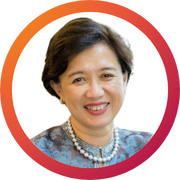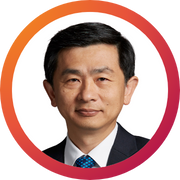Related Meetings
More information coming soon!
More information coming soon!

Kenes MP Asia Pte Ltd
Pico Creative Centre, 20 Kallang Avenue, 2nd Floor, Singapore 339411

Iskander Azwa
Malaysia
Iskandar Azwa is an Associate Professor of Infectious Diseases and is the Clinical Lead for the HIV service in the Infectious Diseases Unit, Faculty of Medicine, University Malaya, Kuala Lumpur. He is also the Director of the Centre of Excellence for Research in Infectious Diseases & AIDS (CERIA), Faculty of Medicine, University Malaya.
His research interests include HIV Pre-exposure prophylaxis (PrEP) implementation research and stigma reduction interventions among key populations and evaluation of novel second line HIV treatment strategies in resource-limited settings. He is the site Principal Investigator (PI) for several international collaborative HIV clinical trials which have shaped HIV guidelines locally and globally. Much of his recent work has focused on increasing community access to HIV prevention biomedical interventions and implementation of differentiated service delivery models of HIV care & prevention including m-health and pharmacy-led service delivery models. He has been a member of several WHO Guidelines development groups on HIV treatment and prevention since 2020.
Iskandar Azwa also serves as the current President of the Malaysian AIDS Council

Prof Derrick Heng
Singapore
GUEST OF HONOUR
Dr Derrick Heng is Deputy Director-General of Health (Public Health) at the Ministry of Health in Singapore, with responsibility for oversight of Communicable Diseases and Non-Communicable Diseases. His areas of work include population health analytics and the provision of public health intelligence to support policy and planning and international co-operation. Derrick has been involved in policy initiatives in the areas of HIV, TB, tobacco control, obesity, chronic disease screening and mental health in Singapore.
Coming from a background in clinical internal medicine, Derrick began working in the field of epidemiology in 1997, after obtaining a Masters at Cambridge University. Before taking on a policy role, he was involved in epidemiological research in the areas of clinical epidemiology, cardiovascular diseases, diabetes and cancer, in addition to interests in research design and methodology, and the ethical review of clinical trials.

Dr Muhammad Bashir Bello
Saudi Arabia
Dr. Muhammad Bashir Bello is a vaccinologist and molecular virologist currently serving as an Associate Research Scientist in the Vaccine Development Division within the Infectious Disease Research Department at KAIMRC, Riyadh, Saudi Arabia. His early research focused on developing a novel reverse genetics-based vaccine targeting Newcastle disease virus genotypes circulating in Malaysia. With specialized expertise in molecular virology, comparative genomics, and vaccinology, Dr. Bello has since been at the forefront of next-generation vaccine development against emerging pathogens, including dengue virus, MERS-CoV, Lassa fever, and COVID-19.
Dr. Bello has successfully secured substantial research funding in Nigeria and Saudi Arabia, along with notable international grants for vaccine-related projects. He has authored numerous high-impact publications, and as an invited speaker at national and international forums, he has widely shared his work and insights. Before joining KAIMRC, he served as Senior Research Associate and Deputy Director at the Center for Advanced Medical Research and Training (CAMRET) at Usmanu Danfodiyo University Sokoto (UDUS), Nigeria. At CAMRET, he led pivotal projects on Lassa fever and COVID-19 vaccines, significantly advancing public health initiatives in West Africa. His leadership extended to national health efforts, including his roles with the Nigeria COVID-19 Research Coalition and the Nigeria Governors’ Forum COVID-19 Technical Advisory Committee.
Dr. Bello has also mentored numerous MSc and PhD students and has taught courses in virology, immunology, and molecular biology at both undergraduate and postgraduate levels. His dedication to capacity-building in Africa is exemplified by his role in developing the MSc Vaccinology program at the University of Rwanda’s Regional Centre of Excellence for Vaccines, Immunisation, and Health Supply Chain Management, designed to train Africa’s future public health leaders.
Currently, Dr. Bello’s research focuses on genomic surveillance and mRNA vaccine development, particularly against dengue and MERS-CoV, underscoring his commitment to advancing vaccine technology and global health preparedness. An active member of professional societies such as the International Veterinary Vaccinology Network, World Society for Virology, African Society for Virology, Biotechnology Society of Nigeria, and Nigeria Society for Immunology, he remains a dedicated contributor to the global fight against infectious diseases.

Takeshi TANAKA
Takeshi TANAKA is a Senior Assistant Professor and Clinical Infectious Disease (ID) Specialist at the Infection Control and Education Center, Nagasaki University Hospital, and also a faculty member at Nagasaki University, School of Tropical Medicine and Global Health. He is a senior Fellow member of the Japanese Association for Infectious Diseases and is actively engaged in ID clinical practice, research, and teaching, as well as antimicrobial stewardship and infection prevention. Most of the efforts in the hospital’s ID consulting services are focused on severe infections in the ICU and severely immunocompromised patients, which involve a wide range of bacteria, viruses, fungi, and parasites. His current research interests are: “regulation of vascular permeability in septic shock and ARDS”, “long-term epidemiology of HIV/AIDS, focusing on opportunistic infections and malignancies”, and “improvement strategy of vaccination for the immunocompromised in Japan”. Currently, he actively collaborates with the Japan International Cooperation Agency (JICA) as a member of the Japan Disaster Relief Team, as part of the National Infectious Diseases Response Team, and as an ID advisor for the JICA project for strengthening countermeasures against ID in Latin American countries (since 2022).

Dr Tetsuji Hori
More information coming soon.

Prof Horng, Jim-Tong
I have been researching RNA viruses, such as enterovirus A71 and influenza viruses for many years, especially focusing on virus-host interaction and antiviral developments. My team has achieved important milestones, such as developing small molecules and botanic drugs that successfully inhibit several RNA viruses, including SARS-CoV-2. I have published these findings in prestigious journals such as Antimicrob. Agents Chemother., J. Antimicrob. Chemother., J. Biol. Chem., J. Med. Chem., Antiviral Res., Emerg. Microbes Infect., and J. Virol.

Dr Ching-Fen Shen
Taiwan
Dr. Ching-Fen Shen is the Head and Honorable Consultant of the Infectious Division in the Department of Pediatrics at National Cheng Kung University Hospital and an Associate Professor in the Department of Pediatrics, College of Medicine, National Cheng Kung University, Tainan, Taiwan. After earning her medical degree from National Cheng Kung University, she completed her medical training at National Cheng Kung University Hospital and obtained an MSc in Clinical Medicine from the same institution.
Dr. Shen’s research focuses on pediatric infectious diseases, including clinical and molecular epidemiology, host immunological responses, and biomarkers for differentiating infection types and severity. Her work also explores vaccine immunogenicity in vulnerable populations. She is particularly interested in understanding the immunological responses in various vulnerable populations to different vaccine platforms, aiming to optimize vaccination strategy recommendations based on her research findings.
In 2024, Dr. Shen was awarded the Taiwan Infectious Diseases Society Member Annual Outstanding Research Award for her work on the immunogenicity of heterologous prime-boost COVID-19 vaccinations in healthcare workers (Clinical Immunology, 2023). Her research incorporates biomarkers discovered in clinical studies into clinically available point-of-care tests (POCTs). Her research group employs various methodologies, including clinical studies, proteomics, transcriptomics, and flow cytometry.
Dr. Shen is also a key member of the Taiwan Pediatric Infectious Disease Alliance (TPIDA), a collaborative consortium of nine pediatric infectious disease departments from tertiary medical centers. TPIDA has established a nationwide disease surveillance network to address major pediatric infectious disease issues.
In collaboration with Prof. Chao-Min Cheng, Dr. Shen is involved in an Industrial/Academic Cooperation Project focused on developing a nanoelectrode array electrochemical sensor for POCTs. This sensor aims to provide real-time, high-sensitivity, and easily interpretable results for clinical diagnosis, measuring host biomarkers or identifying pathogens.
Dr. Shen is part of the EU-Horizon 2020 DIAMONDS consortium (https://www.diamonds2020.eu/), which seeks to develop personalized management strategies for children with febrile illnesses based on new diagnostic tests.
Please be aware of fraudulent websites, companies and individuals that link to the Asia – Pacific Congress of Medical Virology (APCMV 2024) that offer registrations, hotel bookings and other services. APCMV does not accept any responsibility for bookings made via unofficial websites/agencies or any money lost as a result. This website is the official and only APCMV Symposium Registration Page.

Li-Jin Hsu
Taiwan
EDUCATION:
1987.9-1991.6 B.S., School of Technology for Medical Sciences, Kaohsiung Medical College, Kaohsiung, Taiwan ROC
1993.9-1995.6 M.S., Department of Microbiology and Immunology, College of Medicine, National Cheng Kung University, Tainan, Taiwan ROC
1995.9-2002.1 Ph.D., Institute of Basic Medical Sciences, College of Medicine, National Cheng Kung University, Tainan, Taiwan ROC
PROFESSIONAL EXPERIENCE:
1991.8-1993.7 Teaching Assistant, Department of Medical Laboratory Science and Biotechnology, College of Medicine, National Cheng Kung University, Tainan, Taiwan ROC
2002.2-2005.1 Postdoctoral Fellow, Department of Microbiology and Immunology, College of Medicine, National Cheng Kung University, Tainan, Taiwan ROC
2003.5-2004.11 Visiting Postdoctoral Fellow, Laboratory of Molecular Immunology, Guthrie Research Institute, Sayre, Pennsylvania, USA
2005.2-2009.7 Research Assistant Professor, Center for Gene Regulation and Signal Transduction Research, National Cheng Kung University, Tainan, Taiwan ROC
2009.8-2013.7 Assistant Professor, Department of Medical Laboratory Science and Biotechnology, National Cheng Kung University, Tainan, Taiwan ROC
2013.8-2021.7 Associate Professor, Department of Medical Laboratory Science and Biotechnology, National Cheng Kung University, Tainan, Taiwan ROC
2021.8-present Professor, Department of Medical Laboratory Science and Biotechnology, National Cheng Kung University, Tainan, Taiwan ROC

Dr Chia-Yu Chi
Taiwan
Education:
2006-2014 Ph.D., Graduate Institute of Clinical Medicine, National Cheng Kung University
1995-2000 M.D., Post-baccalaureate Medical Department, College of Medicine, Kaohsiung Medical University
1991-1995 B.Sc., Biological Department, National Cheng Kung University
Professional Experience:
2023- Acting Director, National Mosquito-Borne Diseases Control Research Center, National Health Research Institutes
2019- Jointly Appointed Associate Professor, College of Medicine, National Cheng Kung University
2013- Associate Investigator and Attending Physician, National Institute of Infectious Diseases and Vaccinology, National Health Research Institutes
2016-2023 Executive Secretary, National Mosquito-Borne Diseases Control Research Center, National Health Research Institutes
2008-2013 Assistant Investigator and Attending Physician, Division of Infectious Diseases/ National institute of Infectious Diseases and Vaccinology, National Health Research Institutes
2005-2008 Attending Physician, Division of Clinical Research, National Health Research Institutes
2003-2005 Clinical Fellow, Section of Infectious Disease, Department of Pediatric and Internal Medicine, National Chen Kung University Hospital
2000-2003 Resident, Department of Pediatrics, National Chen Kung University Hospital
2004- Member of Infectious Disease Society of Taiwan
2003- Member of Taiwan Pediatric Association
Honors and Awards:
2021 Most Cited Author Award (Biomedical Journal)
2006 Outstanding Publication Award for Resident of The Infectious Disease Society of Taiwan
1995 Inducted into The Phi Tau Phi Scholastic Honor Society of the Republic of China
Publications:

Prof Shin-Hong Shiao
Taiwan
Dr. Shin-Hong SHIAO currently serves as the Professor and Director of the Department of Tropical Medicine and Parasitology at National Taiwan University in Taiwan. He earned his PhD from Université Louis Pasteur in Strasbourg, France, under the guidance of Prof. Jules Hoffmann, the 2011 Nobel Prize Laureate in Physiology or Medicine. Following his PhD, Dr. Shiao completed his postdoctoral training at the University of California, Riverside, under Prof. Alexander Raikhel. With over 20 years of experience in mosquito biology, Dr. Shiao is recognized as a leading expert in mosquito-borne diseases. He has authored over 20 high-impact research articles that primarily explore mosquito-virus interactions, mosquito host factors that combat virus replication and transmission, and the development of antiviral methods.

Prof Julian A. Hiscox
United Kingdom
Julian A. Hiscox is Chair in Infection and Global Health and Deputy Associate Pro-Vice Chancellor for Research and Impact in the Faculty of Health and Life Sciences at the University of Liverpool, UK. He has a BSc in Genetics from University College London (1991) and a PhD in coronaviruses from the University of Reading (1994). Julian completed post-doctoral training at the University of Alabama at Birmingham (USA) and the Institute for Animal Health (Compton, UK). In 1999 he was appointed as a Lecturer in Virology at the University of Reading and then moved to the University of Leeds. In 2012 he was recruited to the University of Liverpool as a Chair. He leads a $9.8M US FDA contract on SARS-CoV-2, MERS-CoV and medical countermeasures and also works on emerging threats including Ebola virus. During the COVID-19 pandemic Julian was a co-opted member of the UK’s New and Emerging Respiratory Virus Threats Advisory Group (NERVTAG) and he is currently a member until 2026. This group advises the government on the threat posed by new and emerging respiratory viruses and he was a participant at SAGE. Julian is Director of the BBSRC/DEFRA funded UK-International coronavirus network.

Prof Jen-Ren Wang
Taiwan
Dr. Jen-Ren Wang is a Distinguished Professor at Medical Laboratory Science and Biotechnology, National Cheng Kung University (NCKU), Taiwan. She is the Principal Investigator of Taiwan CDC collaborating Laboratories of Virology at NCKU Hospital. She is also an Adjunct Investigator of National Institute of Infectious Diseases and Vaccinology, National Health Research Institutes.

Prof Guann-Yi Yu
Taiwan
Dr. Guann-Yi Yu is an experienced virologist specializing in virology and viral pathogenesis. Dr. Yu has focused her research on RNA viruses, including Hepatitis C Virus, Zika Virus, Dengue Virus, and SARS-CoV-2. She is recognized for her work in establishing small animal models to study virus-host interactions and pathogenesis. Additionally, Dr. Yu has explored innate immune responses and inflammation in liver cancer as part of her research interests. Dr. Yu’s commitment to the field extends to her involvement in the establishment of viral collections for the National Infectious Diseases Bank (https://nidb.nhri.edu.tw/) in Taiwan, aiming to address academic and industrial needs in virology.

Prof Chih-Peng Chang
Taiwan
Dr. Chih-Peng Chang received his B.S from the Department of Medical Technology, Kaohsiung Medical University (1996-2000). He has M.S. training in the Department of Microbiology and Immunology, National Cheng Kung University (2000-2002) and obtained the Ph.D. degree from the Institute of Basic Medical Science in National Cheng Kung University in 2008. He continued working as a postdoctoral fellow with Dr. Huan-Yao Lei (2009-2011) and then was recruited as research assistant professor in Center of Infectious Disease and Signaling Research, National Cheng Kung University (2011-2013). In 2013, he was recruited as an assistant professor in the Department of Microbiology and Immunology, National Cheng Kung University, and promoted to associate professor in 2017 and full professor in 2022. Currently, he was appointed as the Director of Center of Infectious Disease and Signaling Research since 2023. Dr. Chang’s research interests focus on the regulatory function of tumor-associated macrophages in tumor microenvironments and host factors in dengue virus (DENV) infection. For DENV study, he recently identified several host factors, including Akt, Beclin-1 and integrin-linked kinase, in regulating DENV replication via manipulating the cell death, autophagy and type-I interferon signaling. His research shows AR-12’s ability to inhibit dengue virus replication by reducing PI3K/AKT activity and GRP78 expression pre- and post-infection in cell culture and mice (Antiviral Research, 2017). He also discovered that DENV-induced autophagy has a dual role, protecting against early cell apoptosis while aiding viral replication, with DENV NS1 preserving Beclin-1 function (International Journal of Molecular Sciences, 2020). Additionally, he found that integrin-linked kinase (ILK) enhances DENV infection by activating the Akt-Erk-NF-κB pathway and suppressing interferon-stimulated genes via SOCS3 expression, suggesting ILK as a potential therapeutic target against DENV (PLoS Pathogens, 2023).

Dr Tzong-Shiann Ho
Taiwan
Dr. Tzong-Shiann Ho is a Clinical Associate Professor at National Cheng Kung University (NCKU) in Tainan, Taiwan, where he also contributes to the Department of Medical Humanities and Social Medicine and the Department of Life Sciences. With degrees in Biology, Microbiology, Immunology, and Medicine from NCKU and Kaohsiung Medical University, Dr. Ho has developed a deep expertise in pediatric infectious diseases, notably in dengue research.
His career includes significant roles such as attending pediatrician and various leadership positions at NCKU-affiliated hospitals. As a clinical educator, he has received multiple teaching awards and has been an active member of several academic societies. Dr. Ho’s research interests include integrating clinical diagnostics with machine learning to improve disease management and patient outcomes.
At the APCMV 2024, Dr. Ho will discuss his recent work on dengue, emphasizing the integration of antibody profiling and machine learning to advance diagnosis and predict disease severity.

Prof Gavin Smith
More information coming soon!

Prof Marco Vignuzzi
Singapore
Marco Vignuzzi obtained his B.Sc from McGill University in Canada, and MSc and PhD from University of Paris. Following 7 years of postdoctoral studies in Raul Andino’s lab at UCSF, he founded his own laboratory at Institute Pasteur in 2008. From 2008-2022, his work focused on emerging viral diseases and antiviral therapies based on approaches that target evolutionary mechanisms. Marco is on the editorial board of J Virology, Virus Research, Virus Evolution and PLOS Pathogens. He ran two DARPA research programs under the US Department of Defense and a French National program on Emerging Infectious Diseases coordinating 65 research laboratories. As a committed globalist promoting international cooperation, his lab has directly collaborated with teams in 66 countries and on every continent. In 2015 his work in emerging diseases was awarded the Sanofi National Award in Biomedical Research; in 2019 he received the international Richard Elliott Memorial Award for his work on zoonotic viral diseases. Since September 2022, he is a Senior Principal Investigator and a Strategic Hire at A*STAR ID Labs, and an adjunct Associate Professor at NUS and NTU. In 2023, he received a NRF Investigator ship. As of 2023, Marco is coordinating A*STAR ID Labs entry into the International Pasteur Network, grouping over 30 research institutes focused on infectious diseases belonging to countries across the globe. In Singapore, Marco will build a research community around his expertise on predictive computational biology and experimental evolution to prepare for future outbreaks and will develop a novel agnostic RNA therapeutics platform that can respond to new viral threats.

Prof Zhengli Shi
China
Dr. Shi is a principal scientist of the Wuhan Institute of Virology, Chinese Academy of Sciences and the Group leader for Emerging Viruses. She focuses her research on pathogen investigation of unknown viruses in wild animals and interspecies infection mechanism of zoonotic viruses. She is in charge for the viral surveillance screening among bat samples leading to the discovery and new recognition of a wide-array of SARS-like coronaviruses, adenoviruses and adeno-associated viruses in mainland China. Her long experience on bat coronavirus led to the rapid identification of the pathogen of COVID-19 and its probable bat origin. Shi won the second prize of Natural Science Award of China in 2018 and was elected as fellowship of American Academy of Microbiology in 2019. She has served since 2017 as Editor-in-Chief for Virologica Sinica.

Prof Linfa Wang
Singapore
Linfa Wang is a professor of the Programme in Emerging Infectious Diseases at Duke-NUS Medical School, and the inaugural executive director of PREPARE, Ministry of Health, Singapore. He is an international leader in the field of emerging zoonotic viruses and virus-host interaction. His current research focuses on why bats are such an important reservoir for emerging viruses and on how we can learn from bats to make us more resilience to infection and diseases in general. He is a member of the WHO SARS Scientific Research Advisory Committee and played a key role in identification of bats as the natural host of SARS-like viruses. In response to the COVID-19 pandemic, he has served/is serving on multiple WHO committees for COVID-19, including the WHO IHR Emergency Committee. Prof Wang has more than 500 scientific publications, including papers in Science, Nature, NEJM and Lancet. He was the Editor-in-Chief for the Virology Journal from 2112-2022. Prof Wang was elected to the Australian Academy of Technological Sciences and Engineering in 2010, the American Academy of Microbiology in 2021 and the Australian Academy of Sciences in 2023. He received the Singapore President Science Award in 2021.

Prof Leo Yee Sin
Singapore
Professor Leo Yee Sin currently holds multiple portfolios including as Senior Consultant at the Director-General Health’s Office in Ministry of Health, Singapore and Senior Advisor, National Centre for Infectious Diseases and National Healthcare Group.
Professor Leo holds dual specialist accreditations as an adult infectious disease physician and public health practitioner. She is the inaugural Executive Director of Singapore’s National Centre for Infectious Diseases (NCID) from 2017 to 2023. During her tenure, she established NCID as an innovative institution integrating clinical care, public health, research, training, and community outreach. She led teams through multiple outbreaks in Singapore, notably from Nipah virus in 1999 and 3 pandemics including SARS-2003, pH1N1 in 2009 and COVID-19 in 2020-2022.
She published over 400 peer-reviewed scientific papers and received numerous national awards. She was recognised as the BBC 100 women in the year 2020 and was conferred the title of Knight of the French Order of the Legion of Honour in 2022. A recognized authority in her field, she chairs and serves as member in numerous committees and advisory boards including multiple World Health Organization workgroups.

Prof Eng Eong Ooi
Singapore
Eng Eong Ooi BMBS, PhD, FRCPath
Professor, Programme in Emerging Infectious Diseases, Duke-NUS Medical School
Associate Dean (Early Research Career Development), Office of Academic Medicine, Duke-NUS Medical School
Professor, Saw Swee Hock School of Public Health, National University of Singapore
Eng Eong trained in medicine at the University of Nottingham and completed his PhD studies on molecular epidemiology at the National University of Singapore. He has been conducting research on various aspects of dengue, from disease mechanisms to epidemiology, for the past 25 years. He is a three-time recipient of the Clinician-Scientist (Senior Investigator) Award and more recently, the recipient of the Singapore Translational Research Award, all from the National Medical Research Council of Singapore. He is a member of the Scientific Advisory Board of Science Translational Medicine and an Editorial Board member of PLoS Biology.

Prof Dato’ Dr Adeeba Kamarulzaman
Malaysia
Professor Adeeba Kamarulzaman is the President & Pro Vice-Chancellor of Monash University Malaysia. Prior to this appointment, she was Dean of the Faculty of Medicine, University Malaya and continues as an Honorary Professor at UM and as Adjunct Associate Professor at Yale University, USA.
An infectious diseases physician by training, Professor Kamarulzaman is a passionate advocate for social justice especially as it pertains to HIV prevention, treatment and care and drug policies. She presently serves as the Chairman of the Malaysian AIDS Foundation and is the immediate Past President of the International AIDS Society. She is also the founding Chair of ROSE Foundation, an organization that is committed to eliminating cervical cancer in Malaysia and regionally.
At the international level, Professor Kamarulzaman has been an advisor to numerous WHO, UNAIDS and UNODC committees on HIV/AIDS and substance use. She is presently Vice Chair of WHO’s Science Council and is a member of the Global Commission on Drug Policy and the Global Council on Inequalities, HIV and Pandemics. Her achievements have been recognised through several national and international awards including as a two-time recipient of the prestigious Merdeka Award and recently as Tokoh Akademik Negara. In April 2015 she was honoured with a Doctor of Laws (honoris causa) from her alma mater, Monash University for her role as a health advocate and contributions to medicine.

Prof Cheng Lin
Taiwan
Dr. Cheng-Wen Lin, a Professor at the Department of Medical Laboratory Science and Biotechnology at China Medical University, Taiwan, has been serving in this role since February 2007. He earned his PhD in Life Science from National Tsing-Hua University, Taiwan, between 1997 and 2003. Prior to his doctoral studies, he completed a Master’s degree in Microbiology and Immunology and a Bachelor’s degree in Medical Technology at National Yang-Ming Medical College, Taiwan.
Dr. Lin specializes in molecular virology, focusing on the pathogenesis and antiviral strategies against (re)emerging viruses, particularly flaviviruses and coronaviruses.
Over the past five years, Dr. Lin’s research has focused on three main areas:
Dr. Lin has been ranked in the top 2% of scientists worldwide in “Single Year Achievement” for 2020, 2021, and 2023, as per Stanford University’s assessment based on the Scopus database. These accolades reflect his substantial contributions to the fields of molecular virology, antiviral research, and diagnostic development.

Dr Carolien Emma van de Sandt
Australia
Dr Carolien Emma van de Sandt is an ARC-DECRA Senior Research Fellow in the Department of Microbiology and Immunology at the University of Melbourne at the The Peter Doherty Institute at the University of Melbourne, Australia. Her principal area of expertise is in viral and aging immunology.
Carolien completed her PhD in 2016 at the Erasmus University in Rotterdam, the Netherlands where she investigated the longevity, cross-reactivity and immune evasion strategies of influenza-specific CD8+ T-cells, followed by two years of postdoctoral research in the laboratory of Profs Rimmelzwaan and Osterhaus.
In 2018, she joined the Kedzierska Laboratory, where she leads the Aging Immunity Research Program which aims to unravel the mechanisms that underly gain-and-loss- of virus-specific CD8+ T-cell function across human lifespan. During the pandemic Carolien studied SARS-CoV-2-specific immunity in children and the elderly at the University of Melbourne. She also temporarily relocated to Sanquin Research in the Netherlands, where she studied SARS-CoV-2 immunity in healthy and immunocompromised autoimmune patients. In 2022 moved back to Melbourne to continue Aging Immunity and T-cell Development Research at the University of Melbourne.

Prof Benhur Lee
United States
Dr. Benhur Lee is a Professor of Microbiology at the Icahn School of Medicine at Mount Sinai (ISMMS). Prof. Lee also holds the Ward-Coleman Chair in Microbiology. He obtained his M.D. from Yale University School of Medicine (1995) and completed his clinical as well as post-doctoral training at the University of Pennsylvania (1995-2001). Dr. Lee is board-certified in Clinical Pathology. Prior to 2014, he was a Professor in the Dept of Microbiology, Immunology & Molecular Genetics, and the Dept of Pathology & Laboratory Medicine at the David Geffen School of Medicine at UCLA (2001-2013).
Dr. Lee is a scientific advisor to the Standards Working Group (SWG) of the California Institute of Regenerative Medicine (CIRM, 2014-present), and was an appointed member of the NIH Director’s Recombinant DNA Advisory Committee (RAC), more recently reconstituted as the Novel and Exceptional Technology and Research Advisory Committee (NExTRAC) (2016-2022). He is an elected fellow of the American Academy of Microbiology and Councilor for Medical Virology (American Society for Virology).
Dr. Lee has a special interest in emerging RNA viruses, with a focus on molecular viralhost interactions. His guiding principle is to translate insights gained from basic studies on host-pathogen interactions into anti-viral therapeutics. Dr. Lee has published over 200 peer-reviewed articles and reviews, and serves on multiple editorial boards. He has trained more than a dozen post-doctoral fellows, 18 graduate students, and has served on more than 60 PhD dissertation committees between UCLA and Mount Sinai.

Priscilla Li-ning Yang
United States
Priscilla earned her PhD in Bio-organic Chemistry at the University of California, Berkeley. Following postdoctoral training in viral immunology at Scripps Research, she started her independent career at Harvard Medical School, building a research group that combines chemical and pharmacological approaches to address fundamental and translational problems in virology. She is currently Professor in the Department of Microbiology and Immunology in the Stanford University School of Medicine. She leads and mentors a multidisciplinary group of scientists focused on discovery and validation of new antiviral targets; development of new strategies to achieve broad-spectrum activity and to avoid antiviral resistance; and investigating the function of lipid membranes in RNA virus replication. Her group has pioneered the development of small molecule-based degraders as antivirals. She is a strong advocate for diversity, equity, and inclusion in science and is proud to have been the recipient of the inaugural International Society for Antiviral Research (ISAR) Women in Science Award and the ISAR William Prusoff Memorial Award in 2022.

Prof Jason Mackenzie
Australia
My research is predominantly on the +ssRNA flaviviruses and caliciviruses, in particular, the cell biology principles utilized during virus infection, and the processes of viral RNA replication, understanding the events of virus replication and how these processes influence cellular functions, and the influences virus replication imparts on immune regulation and dysfunction. I have established a niche position by incorporating multi-faceted approaches that investigate molecular, biochemical, ultrastructural, biological and immunological aspects to virus replication in cells. In particular my expertise in electron-microscopy has been recognised nationally and internationally where I have collaborated with many groups to perform and interpret electron microscopy. I have been instrumental in the elucidation of the flavivirus and norovirus replication complex in terms of viral proteins and utilization of cellular membranes. I have proposed roles for both cellular organelles and the cytoskeleton during these processes. I was one of the few groups internationally to reveal the flavivirus replication complex in 3D utilizing state-of the art electron tomography. I was involved in the identification of the first ever tissue system to investigate norovirus replication. Recently I have investigated the intracellular events associated with virus replication and how both cellular stress and lipid biosynthetic pathways affect virus replication and cellular immune competency. I am currently investigating how intracellular replication of West Nile, dengue, SARS-CoV-2 and Norovirus modulates host processes to promote efficient virus replication and viral immune evasion.

Prof Yoke-Fun Chan
Malaysia
Yoke-Fun Chan is a Professor of Virology at the Department of Medical Microbiology, Faculty of Medicine, University of Malaya, Malaysia. Her research focuses on emerging viruses such as enterovirus A71, SARS-CoV-2, chikungunya virus, Zika virus and influenza virus. She serves as the editor in PLOS Neglected Tropical Diseases. She was the recipient of L’Oréal-UNESCO Malaysia National Fellowship 2014, LOréal-UNESCO International Rising Talents 2015, and ASEAN-US Science Prize for Women 2020.

Prof Veasna Duong
Cambodia
I started my career in virology in October 2005 when I joined the Institut Pasteur du Cambodge as a researcher. I obtained my PhD In 2011 and was appointed Deputy Head of the Virology Unit in 2014.
In August 2020, I took on the leadership role as Head of the Unit. The Virology Unit is a comprehensive department that tackles various viral threats. Our unit is comprised of four main areas of research: Arboviruses, Zoonotic and Emerging Pathogens, Viruses causing respiratory infection and Rabies and Other Viruses of medical concerns. My area of focus has been on arboviruses and emerging zoonotic viruses, which are viruses that can jump from animals to humans.

Prof Shin-Ru Shih
Taiwan
Shin-Ru Shih got her bachelor degree in Medical Technology and master degree in Biochemistry from National Taiwan University and her Ph.D. in Biochemistry and Molecular Biology from Rutgers University, USA. She established the Research Center for Emerging Viral Infections at Chang Gung University in 2009, as center director since then. Her team has been studying various aspects of emerging RNA viruses, including identification of viral pathogens during outbreaks, mechanistic studies of pathogenesis, and development of vaccines and antiviral agents.
Research website: http://rcevi.cgu.edu.tw/
Awards

Prof Peiris Malik
Hong Kong
Malik Peiris is Professor and Chair of Virology at the School of Public Health at The University of Hong Kong. He is a clinical and public health virologist with a particular interest in emerging virus disease at the animal-human interface, including influenza and coronaviruses (SARS-CoV, MERS-CoV, SARS-CoV-2). In 2003, he identified the novel coronavirus that caused SARS and contributed to understanding its origins, diagnosis and control. He has also worked on vector borne viruses, zoonotic, seasonal and pandemic influenza, MERS and COVID-19. He was elected a Fellow of the Royal Society of London in 2006, Foreign Associate of National Academy of Sciences in 2017. He was awarded Canada Gairdner Global Health Award (2021) for his contributions to research and control of emerging virus infections.

Prof Kei Sato
Japan
Dr. Kei Sato is a Professor at The Institute of Medical Science, The University of Tokyo, Japan. Dr. Sato is pioneering a new field of virology that he calls ‘systems virology’, which encompasses multiple aspects of viruses, such as epidemiology, pathogenicity, replication dynamics, and viral structures, and applies this interdisciplinary approach to HIV and SARS-CoV-2. To combat the COVID-19 pandemic, Dr. Sato launched a consortium, ‘The Genotype to Phenotype Japan (G2P-Japan)” which is organized mainly by young virologists, in 2021.

Prof Hongjie Yu
China
Hongjie Yu is a professor of infectious disease in School of Public Health, Fudan University. He was the former Director of the Division for Infectious Diseases, China CDC. Dr Yu joined the Expanded Program on Immunization Division of the Liaoning Provincial CDC in 1994, and he devoted himself in Liaoning province to eradicating polio and elimination of measles for seven years. After selected to participate in the first cohort of Chinese Field Epidemiology Training Program in China CDC in 2001, he was appointed as the Chief of the Branch of Respiratory Infectious Disease, Office for Disease Control and Emergency Response, China CDC in 2003, where he remained until accepting a new position as the Deputy director of the Office for Disease Control and Emergency Response in 2006. From 2010 to 2011, he worked in Centers for Disease Control and Prevention, Atlanta, GA, USA as a guest researcher. In 2012, he was promoted to the Director, Division for Infectious Diseases, China CDC. After serving to public health in China CDC for 16 years, he moved to the School of Public Health, Fudan University as a professor of infectious disease since May 2017.
His research interests include the transmission dynamics, epidemiological parameters, disease burden, evaluation of interventions, patients orientated bedside clinical research to understand the interaction between pathogen infection and host immune response, as well as vaccine efficacy, effectiveness, safety, and cost effectiveness for emerging and re-emerging infectious diseases with public health importance, e.g. COVID-19, human with infection of novel animal influenza virus, seasonal influenza, Hand, foot, and mouth disease caused by enteroviruses, dengue, rabies, pneumococcal and Hib diseases.
Prof. Yu was a member of The WHO Advisory Group of the Global Action Plan (GAP AG) for Influenza Vaccines, member of the WHO Strategic Advisory Group of Experts on Immunization (SAGE) Working Group on influenza vaccines and immunization, and Honorable Professor of the University of Hong Kong. Prof. Yu has published over 260 articles in international peer-review journals, including 2 papers published in Science, 5 in Lancet, 1 in New England Journal of Medicine, 3 in BMJ, 1 in Nature Medicine, 1 in Nature Genetics, 4 in PLoS Medicine, 7 in Lancet Infectious Disease, 1 in Lancet Global Health, 1 in Lancet Public Health, 2 in Lancet Microbe, 1 in Lancet Child & Adolescent Health, 1 in Nature Human Behaviour, 9 in Nature Communications, 1 in Cell Research, 1 in Science Advances, 1 in PNAS as the first author or senior corresponding author. His publications were cited 41,048 times in Google Scholar and h-index = 80.

Prof David Lye
Singapore
Professor David LYE Chien Boon (MBBS, FRACP, FAMS, FRCP) graduated in medicine on the Dean’s List from the University of Melbourne in 1996 and completed specialty training in infectious diseases in Australia in 2004. He returned to Singapore to work at the Department of Infectious Diseases, Tan Tock Seng Hospital (TTSH) in 2005.
Professor Lye is Director, Infectious Disease Research and Training Office, National Centre for Infectious Disease (NCID); professor, Lee Kong Chian School of Medicine and Yong Loo Lin School of Medicine; and deputy executive director, Programme for Research in Epidemic Preparedness and Response (PREPARE), Singapore. He is co-director, Respiratory and Infectious Disease Programme, Lee Kong Chian School of Medicine, and senior consultant, Department of Infectious Diseases, TTSH. At TTSH, he founded and led the Antimicrobial Stewardship Programme from 2009 to 2018. At NCID, he headed Singapore Infectious Disease Clinical Research Network (SCRN) from 2014 to 2020, and Training and Education Office from 2018 to 2020.
He has chaired the National Antimicrobial Stewardship Expert Panel since 2014. He is member, National Antimicrobial Resistance Control Committee, One Health Antimicrobial Resistance Project Team and Expert Committee on COVID-19 Vaccination, Ministry of Health, Singapore. His research interests are in COVID-19, dengue and antimicrobial resistance. He has published more than 360 peer-reviewed manuscripts in journals such as NEJM, Lancet, JAMA, JAMA Oncology, JAMA Pediatrics, Lancet Respiratory Medicine, Lancet Infectious Diseases, Lancet Microbe, Lancet Global Health, Annals Internal Medicine as well as Science, Nature Biotechnology, Nature Reviews Immunology, Nature Microbiology, Nature Communications, Science Translational Medicine, Journal Clinical Investigation and Journal Experimental Medicine. He was a Clarivate Highly Cited Researcher 2022 and 2023, and Stanford University Top 2% Scientist 2022 and 2023.
He is member, Editorial Advisory Board, Journal Global Antimicrobial Resistance. He was formerly associate editor, BMC Infectious Diseases and Scientific Reports; and member, editorial board, JACAntimicrobial Resistance. Professor Lye is President, Society of Infectious Disease (Singapore). He is an advocate for HIV prevention as Vice President, Action for AIDS. Internationally, he is President, Asia Pacific Society of Clinical Microbiology and Infection; ex officio, executive committee, International Society of Antimicrobial Chemotherapy; and member, council, International Society of Infectious Diseases.
Professor Lye’s awards include: Dean’s Award for Teaching Excellence, Yong Loo Lin School of Medicine, 2016; Fellow, International Society of Antimicrobial Chemotherapy, 2020; National Clinical Excellence Team Award, Ministry of Health, 2021; Dean’s Award for Research, Lee Kong Chian School of Medicine, 2021; National Healthcare Group Distinguished Achievement Award, 2022; National Healthcare Group Lee Kong Chian Medicine Clinician/Clinical Scientist Award 2022; Public Administration Award (Silver) (COVID-19).

Dr Le Thi Nguyet Minh
Singapore
Dr. Minh Le obtained her Bachelor’s degree in Life Sciences from NUS, followed by a Ph.D. in Computational and Systems Biology from the Singapore-MIT Alliance in 2010. She then completed five years of postdoctoral training at Boston Children’s Hospital, Harvard Medical School. Afterward, she spent four years at City University of Hong Kong before returning to NUS in 2019. Currently, she holds the position of Assistant Professor and Graduate Program Director at the NUS Medicine Department of Pharmacology. Additionally, she serves in editorial roles, acting as Deputy Editor of the Journal of Extracellular Biology, Associate Editor of the Journal of Extracellular Vesicles, and Associate Editor of Cancer Nanotechnology. Throughout her career, she has received prestigious global and national awards, including the L’Oréal Singapore for Women in Science National Fellowship in 2009, the Jane Coffin Childs Fellowship in 2011, recognition in the book “Stories of Integration” as a Singaporean who made a significant impact in 2021, the Falling Walls Venture Award for her leadership in a science start-up in 2021, and the NUS Graduate Mentor of the Year Award in 2022.
Her groundbreaking research focuses on the development of a drug delivery platform based on extracellular vesicles from red blood cells, aimed at advancing gene delivery for cancer and other diseases. This pioneering work has been published in prestigious journals such as Nature Communications, ACS Nano, Molecular Therapy, and the Journal of Extracellular Vesicles, and laid the foundation for her spin-off company, Carmine Therapeutics, in 2019.

Prof Suresh Mahalingam
Australia
Professor Suresh Mahalingam is an Australia NHMRC Senior Research Fellow and Professor of Viral Immunology with a particular interest in the pathogenesis and treatment of viral-induced inflammatory diseases. He is currently Director of the Global Virus Network (GVN) Centre of Excellence in Arbovirology at the Menzies Health Institute Queensland (Griffith University) in Australia. He has championed research to understand how viruses cause inflammatory disease. He has bridged the gap between basic and clinical research that has generated numerous scientific breakthroughs leading to drugs and vaccines for treatment of human diseases caused by viruses. He is a Fellow of the American Academy of Microbiology, a Fellow of the Royal College of Pathologists of Australasia, and the American Society for Microbiology’s Country Ambassador to Australia.

Prof Stephen Kent
Australia
Professor Stephen Kent is an infectious diseases physician-scientist who helps manage a large research laboratory at the Doherty Institute at the University of Melbourne that studies viral vaccines, particularly for Influenza, COVID-19 and HIV. His translational work has led to several early human trials of vaccines and immunotherapies. He trained in Melbourne and Seattle and is passionate about mentoring the next generation of virologists.

Prof Prasert Auewarakul
Thailand
Prasert Auewarakul is a professor of virology at the Faculty of Medicine Siriraj Hospital, Mahidol University, Thailand.
He graduated with an M.D. from Mahidol University and Dr. Med. from Heidelberg University, Germany. He was a postdoctoral research fellow at Harvard School of Public Health from 1995-1997. His research interests include biology and pathogenesis of influenza and emerging viruses, and antiviral development. He was the president of Biosafety Association (Thailand) from 2012 to 2022, chairman of the Health and Medicine Cluster at the National Science and Technology Development Agency during 2011-2019, president of the Virology Association (Thailand) in 2008-2009, director of Institute of Molecular Biosciences Mahidol University from 2008-2016, and deputy dean for research at the Faculty of Medicine Siriraj Hospital from 2017-2022. He is a founding member of Dengue Alliance, an academic partnership coordinated by Drugs for Neglected Diseases Initiative with the goal of developing specific treatment for dengue hemorrhagic fever.

Prof Zhang Linqi
China
Professor Zhang holds tenured faculty position at School of Medicine of Tsinghua University, Beijing, China. He is also Vanke endowed Chair professor, Bayer endowed Chair professor, and adjunct professor of Chinese Academy of Medical Sciences and Peking Union Medical College. He is the Director of Comprehensive AIDS Research Center, China Director of Indonesia-China Joint Research and Development Center on Vaccines and Genomics, China coordinator of Singapore-China Pandemic Preparedness Project, and Founding member of Pandemic Research Alliance.
Professor Zhang has devoted 35 years to studying HIV-1 pathogenesis and vaccine development and has been a strong advocate for HIV-1 education and prevention among high-risk populations in China, particularly among college students. He has recently expanded his research into emerging and re-emerging human viral pathogens such as SARS-CoV-1, SARS-CoV-2, and MERS-CoV. Using cutting-edge antibody and combinatorial antigen library techniques, Professor Zhang’s team aims to characterize protective antibody immunity in infected humans and rationally design effective antibody therapeutics and vaccines against viral infections. During the COVID-19 pandemic, together with Shenzhen People’s hospital and Brii Biosciences, Professor Zhang’s team developed an antibody combination therapy that demonstrated 80% efficacy in reducing hospitalization and death among high-risk populations in a US NIH-sponsored, multicenter, double-blind, randomized, placebo-controlled study. The combination therapy was the first and only antibody drug approved by China National Medical Products Administration in 2021 to treat adults and pediatric COVID-19 patients, and saved many lives during the pandemic. His team also focuses on developing mucosal vaccines aiming to prevent acquisition and transmission of SARS-CoV-2 and other respiratory viral pathogens.
Professor Zhang is a graduate of University of Edinburgh in United Kingdom and held associate professorship at the Aaron Diamond AIDS Research Center of Rockefeller University in New York before joining Tsinghua University in 2007. Professor Zhang is the Founding Director of AIDS Research Center at Chinese Academy of Medical Sciences and Peking Union Medical College. He is also the Founding Chair of Department of Basic Medical Sciences, Vice Dean of School of Medicine, and Vice Dean of Vanke School of Public Health at Tsinghua University. He has been on the board of the Tsinghua University tenure professor review and evaluation committee. Professor Zhang is the recipient of National Outstanding Young Scientist Award, privileged Changjiang Professorship. He has published over 200 peer-reviewed journal articles and is among the most cited Chinese Researchers in the field of microbiology and immunology as surveyed by Elsevier. Professor Zhang has been serving as the member of national expert committee and advisory board to the Chinese government and several international organizations on HIV/AIDS and infectious diseases and has recently been elected into the foreign fellow of African Academy of Sciences. Due to his outstanding performance in teaching and cultivating young talents, Professor Zhang received the best teacher and friend of student award of Tsinghua University in 2021 as well as the outstanding mentor for graduate student award from Beijing city government in 2022.